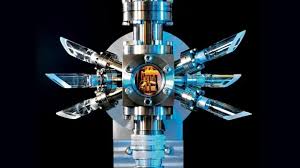Atomic Clocks- Lunar Time Standard:

An international astronomical group has called for a lunar time standard to facilitate future missions, addressing time discrepancies on the Moon due to its unique gravitational effects.
- Atomic clocks are the most precise timekeeping devices, critical for applications requiring extreme accuracy, such as GPS systems, telecommunications, and scientific research.
- These clocks measure time using the resonant frequencies of atoms, such as cesium-133.
- In atomic time, one second is defined by the time it takes for a cesium atom to vibrate 9,192,631,770 times.
- The stability and accuracy of atomic vibrations make atomic clocks the most reliable devices for measuring time.
- Atomic clocks operate using a type of atom known as the cesium atom, which vibrates at a highly stable and precise frequency.
- The process begins in a microwave cavity, a chamber filled with cesium vapour.
- A microwave signal is introduced into this cavity, causing the cesium atoms to vibrate and emit radiation at a specific frequency.
- This emitted frequency is then detected and compared to a standard frequency.
- Any differences between the two frequencies are used to adjust the clock’s timekeeping, ensuring continuous precision.




